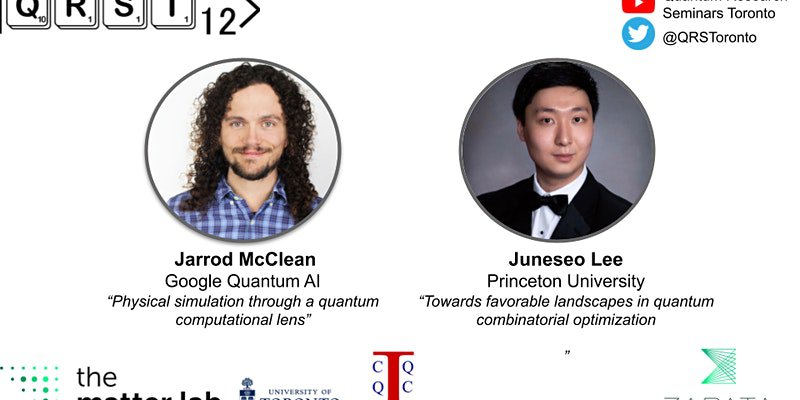
Quantum Research Seminars Toronto consist of two 30 min talks about some Quantum Computation topic. Seminars are given by high-level quantum computing researchers with the focus on disseminating their research among other researchers from this field. We encourage to attend researchers regardless of their experience as well as graduate and undergraduate students with particular interest in this field. Basic notions on quantum computing are assumed, but no expertise in any particular subject of this field.
In this 12th series of seminars, the speakers will be Jarrod McClean (Google Quantum AI) and Juneseo Lee (Princeton University). Their talks are titled "Physical simulation through a quantum computational lens" and "Towards favorable landscapes in quantum combinatorial optimization", respectively.
We will send a Zoom link to those who register for this event 2 days, 2 hours and 10 min before the event starts.
The event recording, slides and chat history will be published in our Youtube channel and sent to the registered participants.
Looking forward to seeing you all!
___________________________________________________________________
Talk 1:
Physical simulation through a quantum computational lens
As quantum technology rapidly advances, a premier application of interest is the simulation of physical, chemical, and material systems to improve the pathway towards novel design. However, even before large, fault-tolerant devices are available, the study of quantum computer science can shape our perspective on the natural world. In this talk, we will first review some of the techniques that make quantum computers especially promising for the simulation of chemical and material systems. From there, we explore what we have learned about the limits of even quantum computing methods, and their relationship with collecting data from nature. In particular, we'll cover recent results on the ways in which data can elevate classical learning models beyond conventional classical computation when samples from a quantum computer are provided. We'll use this to shape an outlook for the future relationship between quantum computing, chemistry, and materials science.
About the speaker:
Jarrod McClean is a staff research scientist in Google's Quantum Artificial Intelligence Lab working on the development of practical quantum algorithms for quantum simulation and other problems. He received his PhD in Chemical Physics from Harvard University specializing in quantum chemistry and quantum computation supported by the US Department of Energy as a Computational Science Graduate Fellow. His research interests broadly include quantum computation, machine learning, artificial intelligence, and the limits of computation.
__________________________
Talk 2:
Towards favorable landscapes in quantum combinatorial optimization
The performance of variational quantum algorithms relies on the success of using quantum and classical computing resources in tandem. Here, we study how these quantum and classical components interrelate. In particular, we focus on algorithms for solving the combinatorial optimization problem MaxCut, and study how the structure of the classical optimization landscape relates to the quantum circuit used to evaluate the MaxCut objective function. In order to analytically characterize the impact of quantum features on the landscape critical point structure, we consider a family of quantum circuit ansätze composed of mutually commuting elements. We identify multiqubit operations as a key resource, and show that overparameterization allows for obtaining favorable landscapes. Namely, we prove that an ansatz from this family containing exponentially many variational parameters yields a landscape free of local optima for generic graphs. However, we further prove that these ansätze do not offer superpolynomial advantages over purely classical MaxCut algorithms. We then present a series of numerical experiments illustrating that non-commutativity and entanglement are important features for improving algorithm performance.
About the speaker:
Juneseo Lee is a recent graduate from the Department of Mathematics at Princeton University. He has done theoretical research in quantum speed limits, and has recently gained interest in variational quantum algorithms and their corresponding optimization landscapes. In particular, he hopes that an interdisciplinary approach to studying VQAs will allow for breakthroughs in the NISQ era.

